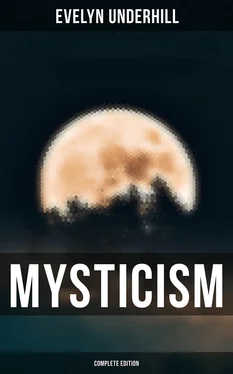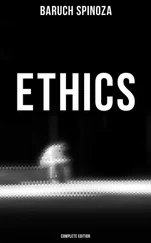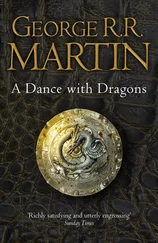1 ...6 7 8 10 11 12 ...38 Of all those forms of life and thought with which humanity has fed its craving for truth, mysticism alone postulates, and in the persons of its great initiates proves, not only the existence of the Absolute, but also this link: this possibility first of knowing, finally of attaining it. It denies that possible knowledge is to be limited ( a ) to sense impressions, ( b ) to any process of intellection, ( c ) to the unfolding of the content of normal consciousness. Such diagrams of experience, it says, are hopelessly incomplete. The mystics find the basis of their method not in logic but in life: in the existence of a discoverable “real,” a spark of true being, within the seeking subject, which can, in that ineffable experience which they call the “act of union,” fuse itself with and thus apprehend the reality of the sought Object. In theological language, their theory of knowledge is that the spirit of man, itself essentially divine, is capable of immediate communion with God, the One Reality.20
In mysticism that love of truth which we saw as the beginning of all philosophy leaves the merely intellectual sphere, and takes on the assured aspect of a personal passion. Where the philosopher guesses and argues, the mystic lives and looks; and speaks, consequently, the disconcerting language of first-hand experience, not the neat dialectic of the schools. Hence whilst the Absolute of the metaphysicians remains a diagram — impersonal and unattainable — the Absolute of the mystics is lovable, attainable, alive.
“Oh, taste and see!” they cry, in accents of astounding certainty and joy. “Ours is an experimental science. We can but communicate our system, never its result. We come to you not as thinkers, but as doers. Leave your deep and absurd trust in the senses, with their language of dot and dash, which may possibly report fact but can never communicate personality. If philosophy has taught you anything, she has surely taught you the length of her tether, and the impossibility of attaining to the doubtless admirable grazing land which lies beyond it. One after another, idealists have arisen who, straining frantically at the rope, have announced to the world their approaching liberty; only to be flung back at last into the little circle of sensation. But here we are, a small family, it is true, yet one that refuses to die out, assuring you that we have slipped the knot and are free of those grazing grounds. This is evidence which you are bound to bring into account before you can add up the sum total of possible knowledge; for you will find it impossible to prove that the world as seen by the mystics, ‘unimaginable, formless, dark with excess of bright,’ is less real than that which is expounded by the youngest and most promising demonstrator of a physicochemical universe. We will be quite candid with you. Examine us as much as you like: our machinery, our veracity, our results. We cannot promise that you shall see what we have seen, for here each man must adventure for himself; but we defy you to stigmatize our experiences as impossible or invalid. Is your world of experience so well and logically founded that you dare make of it a standard? Philosophy tells you that it is founded on nothing better than the reports of your sensory apparatus and the traditional concepts of the race. Certainly it is imperfect, probably it is illusion in any event, it never touches the foundation of things. Whereas ‘what the world, which truly knows nothing, calls “mysticism” is the science of ultimates, . . . the science of self-evident Reality, which cannot be “reasoned about,” because it is the object of pure reason or perception.’“21
Chapter 2
Mysticism and Vitalism
Table of Contents
We glanced, at the beginning of this inquiry, at the universes which result from the various forms of credulity practised by the materialist, the idealist, and the sceptic. We saw the mystic denying by word and act the validity of the foundations on which those universes are built: substituting his living experience for their conceptual schemes. But there is another way of seeing reality or, more correctly, one aspect of reality. This scheme of things possesses the merit of accepting and harmonizing many different forms of experience; even those supreme experiences and intuitions peculiar to the mystics. The first distinct contribution of the twentieth century to man’s quest of the Real, it entered the philosophic arena from several different directions; penetrating and modifying current conceptions not only of philosophy but of religion, science, art and practical life. It was applied by Driesch22 and other biologists in the sphere of organic life. Bergson,23 starting from psychology, developed its intellectual and metaphysical implications; whilst Rudolph Eucken24 constructed from, or beside it, a philosophy of the Spirit, of man’s relations to the Real.
In all these we find the same principle; the principle of a free spontaneous and creative life as the essence of Reality. Not law but aliveness, incalculable and indomitable, is their subject-matter: not human logic, but actual living experience is their criterion of truth. Vitalists, whether the sphere of their explorations be biology, psychology or ethics, see the whole Cosmos, the physical and spiritual worlds, as instinct with initiative and spontaneity: as above all things free. For them, nature, though conditioned by the matter with which she works, is stronger than her chains. Pushing out from within, ever seeking expression, she buds and breaks forth into original creation.25 The iron “laws” of the determinists are merely her observed habits, not her fetters: and man, seeing nature in the terms of “cause and effect,” has been the dupe of his own limitations and prejudices.
Bergson, Nietzsche, Eucken, differing in their opinion as to life’s meaning, are alike in this vision: in the stress which they lay on the supreme importance and value of life — a great Cosmic life transcending and including our own. This is materialism inside out: for here what we call the universe is presented as an expression of life, not life as an expression or by-product of the universe. The strange passionate philosophy of Nietzsche is really built upon an intense belief in this supernal nature and value of Life, Action and Strength: and spoilt by the one-sided individualism which prevented him from holding a just balance between the great and significant life of the Ego and the greater and more significant life of the All.
Obviously, the merit of vitalistic philosophy lies in its ability to satisfy so many different thinkers, starting from such diverse points in our common experience. On the phenomenal side it can accept and transfigure the statements of physical science. In its metaphysical aspect it leaves place for those ontological speculations which seem to take their rise in psychology. It is friendly to those who demand an important place for moral and spiritual activity in the universe. Finally — though here we must be content with deduction rather than declaration — it leaves in the hands of the mystics that power of attaining to Absolute Reality which they have always claimed: shows them as the true possessors of freedom, the torch-bearers of the race.
Did it acknowledge its ancestors with that reverence which is their due, Vitalism would identify itself with the mystic philosopher, Heracleitus; who, in the fifth century B.C., introduced its central idea to the European world26: for his “Logos” or Energizing Fire is but another symbol for that free and living Spirit of Becoming, that indwelling creative power, which Vitalism acknowledges as the very soul or immanent reality of things. It is in essence both a Hellenic and a Christian system of thought. In its view of the proper function of the intellect it has some unexpected affinities with Aristotle, and after him with St. Thomas Aquinas; regarding it as a departmental affair, not the organ of ultimate knowledge. Its theory of knowledge is close to that of the mystics: or would be, if those gazers on reality had interested themselves in any psychological theory of their own experiences.
Читать дальше












